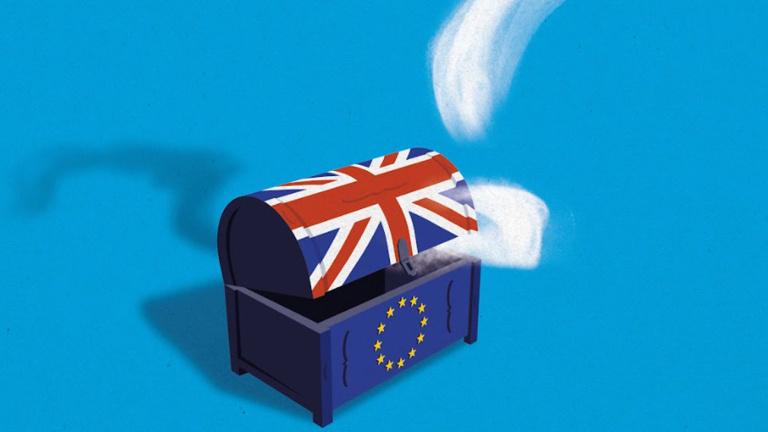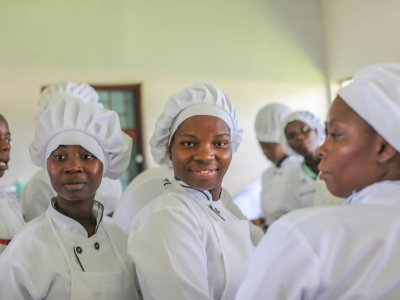
The Brexit Box
The ‘Brexit box’, on the cover of this special issue likened to Pandora’s box of Greek mythology, represents a less fatalistic and hopefully more constructive outlook on the future. As yet, that future is masked by a smokescreen in the form of a question mark. In spite of the uncertainty, we can anticipate that Brexit may have positive, neutral and negative effects.
Some smoke elements represent potential beneficial effects. In the field of trade, Alan Matthews writes that Brexit may indirectly ‘improve the position of developing countries competing with EU exporters on the UK market’. Nicholas Westcott observes that ‘for Africa and other developing countries, Brexit is a golden opportunity to secure better access, greater protection, and more aid from Britain’. In a different field, gender, Gill Allwood seems to suggest that the departure of the UK (seen as a champion of gender mainstreaming in development cooperation) might paradoxically strengthen the EU’s gender awareness. In diplomacy, Tom Cargill sees opportunities for UK engagement in Africa, but only if the UK invests in its own capacity.
‘Business as usual’ or a mixed outcome is represented by other smoke plumes. In the field of security, Simon Duke explains that because the UK has ‘exaggerated its contribution to CSDP operations’, the loss for the EU caused by Brexit may be less than some assume, particularly in operations on the African continent. In the non-competitive field of aid – apart from the devaluation of the sterling – British contributions are likely to remain stable after the transition, liana Olivié and Aitor Pérez predict. The question is only how and via what channels money will be disbursed. There are manifold ways for the EU and the UK to continue their collaboration, as our choice matrix indicates (cf. page 16). Here the future will in part be a matter of policy preference.
The shadow of the question mark represents potential risks for the UK and the EU, and beyond. Threats loom all-round. The EU will feel not only a ‘gap in the budget’, but also the loss of the UK as a recognised diplomatic actor and development player, Linda McAvan writes. The UK will face logistical challenges in managing migration without the EU, as Giacomo Orsini details. Looking beyond a reductive short-term focus on the EU and the UK, Tamsyn Barton points out the need for ‘parallel and complementary UK and EU programmes [to] reduce poverty’, and both Nicholas Westcott and Philippe Darmuzey call for a long-term perspective to mitigate risks and successfully envisage how things could be after ‘the dust settles’.
The smoke-ejecting Brexit box was opened by the referendum of 23 June 2016. It will close on 29 March 2019, by which time a withdrawal agreement must be reached to avoid a ‘cliff-edge’ Brexit. The following day, the box will forcefully, perhaps indefinitely, be opened again. The time until March 2019 represents the current window of both opportunity and threat. Until then, thinkers and practitioners alike, from Europe and beyond, can discern and make use of constructive building blocks while they are still within grasp.
At the time of writing, the second phase of the negotiations, focused on future EU-UK relations, had started but rather timidly. Basic choices regarding the nature of the fundamental framework had yet to be agreed. This uncertainty affects many, as ‘embassies of developing countries [are] keen to know whether they will be able to trade with the UK on the same terms’, Linda McAvan writes. David Jessop looks at how Caribbean exporters of goods and services might deal with uncertainty. By taking a wait-and-see approach, Alan Matthews writes. Even if the UK acquires the right to renegotiate trade and other agreements until the end of the transition in 2020 (as the current draft withdrawal agreement foresees), third countries will expect clarity on the EU-UK relation before venturing into such negotiations, as San Bilal and Sean Woolfrey observe.
Europe’s and the UK’s position in the world, and global relations with Europe, will be influenced by whether, and how judiciously, the Brexit box is used to confront pending questions in the little time that remains. To this point, topics beyond the EU-UK story have been sadly absent from the top table of Brexit discussions.
The positions related to Africa, development, and international cooperation more widely have been held hostage to the dynamics of the wider negotiations. Yet, the UK (traditionally a strong global actor in these fields) has profiled itself on these issues early in the negotiations. Recently it put forward peace and security, humanitarian assistance, and migration as priority areas of future collaboration. Some of our authors point to the possibility of missed opportunities due to the lack of mutual prioritisation on these issues. To help frame the debate we briefly reference some of the official positions (cf. p. 28), also to compensate for the absence of high-level political contributions, which is unusual for Great Insights but might be explained by the uncertainty and under-prioritisation mentioned.
Read the full magazine issue








